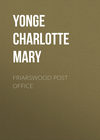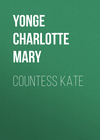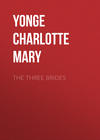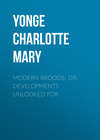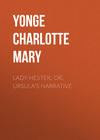Loe raamatut: «Heartsease; Or, The Brother's Wife», lehekülg 36
CHAPTER 8
But one, I wis, was not at home,
Another had paid his gold away,
Another called him thriftless loone,
And bade him sharply wend his way.
—Heir of Lynne
‘He is done for. That wife of his may feel the consequence of meddling in other folk’s concerns. Not that I care for that now, there’s metal more attractive; but she has crossed me, and shall suffer for it.’ These short sentences met the ear of a broad-shouldered man in a rough coat, as, in elbowing his way through the crowd on the quay at Boulogne, he was detained for a moment behind two persons, whose very backs had all the aspect of the dissipated Englishman abroad. Struggling past, he gained a side view of the face of the speaker. It was one which he knew; but the vindictive glare in the sarcastic eyes positively made him start, as he heard the laugh of triumph and derision, in reply to some remark from the other.
‘Ay! and got enough to get off to Paris, where the old Finch has dropped off his perch at last. That was all I wanted of him, and it was time to wring him dry and have done with him. He will go off in consumption before the year is out—’
As he spoke, the stranger turned on him an honest English face, the lips compressed into an expression of the utmost contempt, while indignation flashed in the penetrating gray eyes, that looked on him steadily. His bold defiant gaze fell, quailing and scowling, he seemed to become small, shrink away, and disappeared.
‘When scamp number two looks round for scamp number one, he is lost in the crowd,’ muttered the traveller, half smiling; then, with a deep breath, ‘The hard-hearted rascal! If one could only wring his neck! Heaven help the victim! though, no doubt, pity is wasted on him.’
He ceased his reflections, to enter the steamer just starting for Folkestone, and was soon standing on deck, keeping guard over his luggage. The sound of a frequent cough attracted his attention, and, looking round, he saw a tall figure wrapped in great-coats leaning on the leeward side of the funnel.
‘Hollo! you here, Arthur! Where have you been?’
‘What, Percy? How d’ye do?’ replied a hoarse, languid voice.
‘Is Mrs. Martindale here?’
‘No.’ He was cut short by such violent cough that he was obliged to rest his forehead on his arm; then shivering, and complaining of the cold, he said he should go below, and moved away, rejecting Percy’s offered arm with some impatience.
The weather was beautiful, and Percy stood for some time watching the receding shore, and scanning, with his wonted keen gaze, the various countenances of the passengers. He took a book from his pocket, but did not read long; he looked out on the sea, and muttered to himself, ‘What folly now? Why won’t that name let one rest? Besides, he looked desperately ill; I must go and see if they have made him comfortable in that dog-hole below.’
Percy shook himself as if he was out of humour; and, with his hands in his pockets, and a sauntering step, entered the cabin. He found Arthur there alone, his head resting on his arms, and his frame shaken by the suppressed cough.
‘You seem to have a terrible cold. This is a bad time to be crossing. How long have you been abroad?’
‘Ten days.—How came you here?’
‘I am going to Worthbourne. How are all your folks!’
‘All well;’ and coughing again, he filled up a tumbler with spirits and water, and drank it off, while Percy exclaimed:
‘Are you running crazy, to be feeding such a cough in this way?’
‘The only thing to warm one,’ said he, shuddering from head to foot.
‘Yes, warm you properly into a nice little fever and inflammation. Why, what a hand you have! And your pulse! Here, lie down at once,’ as he formed a couch with the help of a wrapper and bag. Arthur passively accepted his care; but as the chill again crept through his veins, he stretched out his hand for the cordial.
‘I won’t have it done!’ thundered Percy. ‘I will not look on and see you killing yourself!’
‘I wish I could,’ murmured Arthur, letting his hand drop, as if unequal to contest the point.
The conviction suddenly flashed on Percy that he was the victim! ‘You have got yourself into a scrape’ he said.
‘Scrape! I tell you I am ruined! undone!’ exclaimed Arthur, rearing himself up, as he burst out into passionate imprecations on Mark Gardner, cut short by coughing.
‘You! with your wife and little children entirely depending on you! You have allowed that scoundrel, whose baseness you knew, to dupe you to your own destruction!’ said Percy, with slowness and severity.
Too ill and wretched to resent the reproach, Arthur sank his head with a heavy groan, that almost disarmed Percy; then looking up, with sparkling eyes, he exclaimed, ‘No! I did not know his baseness; I thought him a careless scape-grace, but not much worse than he has made me. I would as soon have believed myself capable of the treachery, the unfeeling revenge—’ Again he was unable to say more, and struggling for utterance, he stamped his foot against the floor, and groaned aloud with rage and pain.
Percy persuaded him to lie down again, and could not refrain from forcible expressions of indignation, as he recollected the sneering exultation of Gardner’s tone of triumph over one so open-hearted and confiding.
It was a moment when sympathy unlocked the heart, and shame was lost in the sense of injury. Nothing more was needed to call from Arthur the history of his wrongs, as well as he was able to tell it, eking out with his papers the incoherent sentences which he was unable to finish, so that Percy succeeded in collecting, from his broken narration, an idea of the state of affairs.
The horses, kept jointly at his expense and that of Gardner, had been the occasion of serious debts; and on Gardner’s leaving England, there had been a pressure on Colonel Martindale that rendered him anxious to free himself, even at the cost of his commission. Gardner, on the other hand, had, it appeared, been desirous to have him at Boulogne, perhaps, at first, merely as a means of subsistence during the year of probation, and on the failure of the first attempt at bringing him thither, had written to invite him, holding out as an inducement, that he was himself desirous of being disembarrassed, in order that Miss Brandon might find him clear of this entanglement, and representing that he had still property enough to clear off his portion of the liability.
With this view Arthur had gone out to Boulogne to meet him, but had found him dilatory in entering on business, and was drawn into taking part in the amusements of the place; living in a state of fevered excitement, which aggravated his indisposition and confused his perceptions, so that he fell more completely than ever into the power of his false friend, and was argued into relinquishing his project of selling the horses, and into taking up larger sums for keeping them on. In fact, the sensation that a severe cold was impending, and disgust at the notion of being laid up in such company rendered him doubly facile; and, in restless impatience to get away and avoid discussion, he acceded to everything, and signed whatever Gardner pleased. Not till he was on the point of embarking, after having gambled away most of his ready money, did he discover that the property of which he had heard so much was only a shadow, which had served to delude many another creditor; and that they had made themselves responsible for a monstrous amount, for which he was left alone to answer, while the first demand would be the signal for a multitude of other claims. As they parted, Gardner had finally thrown off the mask, and let him know that this was the recompense of his wife’s stories to the Brandons. She might say what she pleased now, it mattered not; Mark was on his way to the rich widow of Mr. Finch, and had wanted nothing of Arthur but to obtain the means of going to her, and to be revenged on him.
So Arthur half-expressed, and his friend understood. Save for this bodily condition, Percy could hardly have borne with him. His reckless self-indulgence and blind folly deserved to be left to reap their own fruit; yet, when he beheld their victim, miserable, prostrated by illness and despair, and cast aside with scornful cruelty, he could not, without being as cold-hearted as Gardner himself, refrain from kind words and suggestions of consolation. ‘Might not his father assist him?’
‘He cannot if he would. Everything is entailed, and you know how my aunt served us. There is no ready money to be had, not even the five thousand pounds that is the whole dependence for the poor things at home in case of my death, which may come soon enough for aught I care. I wish it was! I wish we were all going to the bottom together, and I was to see none of their faces again. It would be better for Violet than this.’
Percy could say little; but, though blunt of speech, he was tender of heart. He did all in his power for Arthur’s comfort, and when he helped him on shore at Folkestone, recommended him to go to bed at once, and offered to fetch Mrs. Martindale.
‘She cannot come,’ sighed Arthur; ‘she has only been confined three weeks.’
More shame for you, had Percy almost said; but he no longer opposed Arthur’s homeward instinct, and, finding a train ready to start, left their luggage to its fate, and resolved not to lose sight of him till he was safely deposited at his own house. Such care was in truth needed; the journey was a dreadful one, the suffering increased every hour, and when at length, in the dusk of the evening, they arrived in Cadogan-place, he could hardly mount the stairs, even with Percy’s assistance.
It was the first time that Violet had left her chamber, and, as the drawing-room door opened, she was seen sitting, pale and delicate, in her low chair by the fire, her babe on her lap, and the other three at her feet, Johnnie presiding over his sisters, as they looked at a book of prints.
She started up in alarm as Arthur entered, leaning on Mr. Fotheringham, and at once seized by a paroxysm of severe cough. Percy tried to assume a reassuring tone. ‘Here, you see, I have brought him home with one of his bad colds. He will speak for himself presently.’
In a second she had placed the infant on the sofa, signed to Johnnie to watch him, and drawn the arm-chair to the fire. Arthur sank into it, throwing his arm round her for support, and resting his weary head against her, as if he had found his refuge. Percy relieved her from the two little girls, unclasping their frightened grasp on her dress so gently and firmly, that, stranger though he was, Anna did not cry on being taken in his arms, nor Helen resist his leading her out of the room, and desiring her to take her sister up-stairs and to call their nurse.
Returning, he found that necessity had brought strength and presence of mind to their mother. She did not even tremble, though Arthur’s only words were, ‘We are undone. If I die, forgive me.’ Indeed, she hardly took in the sense of what he said; she only caressed, and tried to relieve him, assisted by Percy, who did not leave them till he had seen Arthur safely in charge of Mr. Harding.
He then walked away to his old lodgings in Piccadilly, where he was recognized with ecstasy by the quondam ragged-school boy, and was gladly welcomed by his landlady, who could not rejoice enough at the sight of his good-humoured face.
He divided his time between friendly gossip on her family affairs as she bustled in and out, in civility to the cat, and in railing at himself for thinking twice of such a selfish, ne’er-do-well as Arthur Martindale. The image of that pale young mother and her little ones pursued him, and with it the thought of the complicated distresses awaiting her; the knowledge of the debts that would almost beggar her, coming in the midst of her husband’s dangerous illness.
Percy muttered to himself lines of ‘Who comes here—a Grenadier,’ made a face, stretched himself, and called on himself to look on reasonableness and justice. Arthur deserved no favour, because he had encumbered himself with a helpless family, and then cruelly disregarded them.
‘What does a man deserve who leaves his wife with a child of a week old, to run after a swindler in foreign parts—eh, puss?’ said he aloud, viciously tweaking the old cat’s whiskers; then, as she shook her ears and drew back, too dignified to be offended, ‘Ay, ay, while wheat and tares grow together, the innocent must suffer for the guilty. The better for both. One is refined, the other softened. I am the innocent sufferer now,’ added he; ‘condole with me, pussy! That essay would have been worth eighty pounds if it was worth a sixpence; and there’s a loss for a striving young man! I cannot go on to Worthbourne without recovering it; and who knows how Jane will interpret my delay? While I live I’ll never carry another manuscript anywhere but in my pocket, and then we should all go to the bottom together, according to poor Arthur’s friendly wish. Ha! that’s not it sticking out of my great-coat pocket? No such good luck-only those absurd papers of poor Arthur’s. I remember I loaded my coat on him when we were going to land. What a business it is! Let us overhaul them a bit.’
He became absorbed in the contemplation, only now and then giving vent to some vituperative epithet, till he suddenly dashed his hand on the table with a force that startled the cat from her doze.
‘Never mind, puss; you know of old
‘I care for nobody, and nobody cares for me.’
So now, good night, and there’s an end of the matter.’
The first thing he did, next morning, was to walk to Cadogan-place, to return the papers. He had long to wait before the door was opened; and when James at length came, it was almost crying that he said that Colonel Martindale was very ill; he had ruptured a blood-vessel that morning, and was in the most imminent danger.
Mr. Fotheringham could see no one—could not be of any service. He walked across the street, looked up at the windows, mused, then exclaimed, ‘That being the case, I had better go at once to Folkestone, and rescue my bag from the jaws of the Custom-house.’
CHAPTER 9
She left the gleam-lit fire-place,
She came to the bedside,
Her look was like a sad embrace,
The gaze of one who can divine
A grief, and sympathize.
Sweet flower, thy children’s eyes
Are not more innocent than thine.
—M. ARNOLD—Tristram and Yseulte.
At last there was a respite. The choking, stifling flow of blood, that, with brief intervals, had for the last two hours threatened momentary death, had been at length checked; the eyes were closed that had roamed in helpless affright and agony from Violet to the doctors; and the sufferer was lying, in what his wife would fain have deemed a slumber, but the gasping respiration and looks of distress made it but too evident that it was the stillness of exhaustion, enhanced by dread of renewing the bleeding by word or motion.
There could be no concealment of the exceeding danger. His lungs had never been strong; and the slight cough, which, contrary to his usual habits, he had neglected all the summer, had been the token of mischief, which his recent expedition had aggravated to a fearful extent. Even the violent bleeding had not relieved the inflammation on the chest, and Violet had collected from the physician’s looks and words that it could be hardly expected that he should survive the day.
Yet, through that dreadful morning, she had not failed in resolution or composure: never once had her husband seen in her look, or heard in her tone, aught but what might cheer and sustain him—never had her fortitude or steadiness given way. She had not time to think of consolation and support; but her habit of prayer and trust came to her aid, and brought strength and support around her “in these great waterfloods” of trouble. She was not forsaken in her hour of need. Hitherto there had been no space for reflection; now his quiescent state, though for the present so great a relief, brought the opportunity of realizing his situation; but therewith arose thankfulness for the space thus granted, and the power of praying that it might be blessed to him whether for life or death.
In watchfulness and supplication, she sat beside him, with her babe, much afraid that it should disturb him, and be unwelcome. However, when some little sound made him aware of its presence, he opened his eyes, moved his hand, as if to put back the covering that hid its face from him, and presently signed to have it placed on the bed by his side. It was a fine large dark boy, already so like him as to make the contrast the more striking and painful, between the unconscious serenity of the babe and the restless misery of the face of the father, laid low in the strength of manhood, and with a look of wretched uneasiness, as if the load on the mind was a worse torment than the weight on the labouring breath. He, who usually hardly deigned a glance at his infants, now lay gazing with inexpressible softness and sadness at the little sleeping face; and Violet, while gratified by that look of affection, could not help having it the more borne in on her mind, that death must be very near. Were the well-springs of love, so long closed up, only opening when he was about to leave his children for ever? If she could only have heard him speak!
Presently, as if there was some sting of reproach in the impassive features, he turned his head away abruptly, with a deep groan, and hid his face. She took away the child, and there was another silence, which she ventured to break now and then, by a few sentences of faith and prayer, but without being able to perceive whether he attended. Suddenly he started, as if thrilled in every vein, and glanced around with terrified anxiety, of which she could not at first perceive the cause, till she found it was the postman’s knock. He held out his hand for the letters, and cast a hurried look at their directions. None were for him, but there was one in his sister’s hand-writing. Violet did not feel herself able to read it, and was laying it aside, when she saw his looks following it. Her present world was so entirely in that room that she had forgotten all beyond; and it only now occurred to her to say, ‘Your father? Do you wish for him? I will write.’
‘Telegraph.’ Even this whisper brought back the cough that was anguish and terror.
It was already so late in the day, that though thus summoned, there was no chance of Lord Martindale’s arriving till the following evening; and Violet’s heart sank at reckoning up the space that must elapse, more especially when she saw the perturbed eye, the startings at each sound, the determination to know the business of every one who came to speak to her—evident indications that there was some anxiety on his mind which she could not comprehend.
Thus passed the day—between visits from desponding doctors and vain measures for reducing the inflammation. At night Mr. Harding would have prevailed on her to go to rest, promising to keep watch in her stead; but she only shook her head, and said she could not. She had not seen, and had scarcely thought of, the elder children all day; but at about eleven o’clock at night she was startled by a sound of lamentable crying,—Johnnie’s voice in the nursery. The poor little boy’s nerves had been so much shaken by the fire at Martindale, that he had become subject to night alarms, which sometimes showed their effect for the whole subsequent day; and his mother stole away on hearing his cry, leaving Arthur in Mr. Harding’s charge, and hoping not to be missed.
Sarah was standing over Johnnie, half-coaxing, half-scolding while he sat up in his little crib, shivering and sobbing, with chattering teeth, and terrified exclamations about papa all over blood, lying dead under the burning windows.
‘There now, you have brought your poor mamma up!’ said Sarah, indignantly.
‘Mamma, mamma!’ and the cold trembling little creature clasped itself upon her neck and bosom, still repeating the dreadful words. She carried him to the fire, warmed him on her lap, caressed and soothed him, as his understanding awoke, telling him that papa was safe in his own room,—he was ill, very ill, and Johnnie must pray for him; but oh! he was alive, safe in his own bed. But as Johnnie nestled to her, repeating, ‘Say it again, mamma, I was so frightened! I can’t get it out of my head. Oh! is papa safe?’ there would come the thought that, with morning, the child might have to hear that he was fatherless.
This dread, and the desire to efface the impression of the terrible dream, induced her, when he had obediently struggled for composure, to tell him that, on condition of perfect stillness, he might come down with her, and have a little glimpse of papa. Wrapping him up, she took him in by the open dressing-room door, to which Arthur’s back was turned, trusting to escape observation. But nothing eluded those fever-lighted eyes, and they instantly fell upon the little trembling figure, the quivering face and earnest gaze.
‘I hope we have not disturbed you,’ apologized Violet; ‘we hoped you would not hear us. Poor Johnnie woke up crying so much at your being ill, that I ventured to bring him to have one look at you, for fear he should not go to sleep again.’
She need not have feared. Even while she spoke Arthur held out his hands, with a countenance that caused Johnnie, with a stifled exclamation of ‘Papa! papa!’ to spring on the bed, and there he lay, folded closely to his father’s breast.
It was but for a moment. Violet had to lift the child hastily away, to be carried off by Sarah, that he might not witness the terrible suffering caused by the exertion and emotion; and yet, when this was passed, she could not repent of what she had done, for one great grief had thus been spared to herself and her boy.
She knew that to discover his son’s ardent affection must be a poignant reproach for his neglect and jealousy, and she grieved at once for him and with him; but she could not understand half the feelings of bitter anguish that she perceived in his countenance and gestures. She did not know of his expectation that each ring of the bell might bring the creditors’ claims to heap disgrace upon him, nor how painful were the thoughts of her and of the children, totally unprovided for, without claim during his father’s lifetime, even on his own scanty portion as a younger son. He could only cast them on the mercy of his father and brother; and what right had he to expect anything from them, after his abuse of their kindness and forbearance? He thought of his neglect of his patient devoted wife, whom he was leaving, with her little ones, to struggle with poverty and dependence; he thought of his children growing up to know him only as the improvident selfish father, who had doomed them to difficulties, and without one tender word or kind look to grace his memory. No wonder he turned, unable to brook the sight of his unconscious babe; and that, when with morning little steps and voices sounded above, such a look of misery came over his face, that Violet hastened to order the children down to the dining-room, out of hearing.
Ere long, however, from the other room, appropriated to the baby, a face peeped in, and Johnnie sprang to her side with earnest whispers: ‘Mamma, may I not say my prayers with you! I will not wake papa, but I can’t bear it without!’ and the tears were in his eyes.
Violet’s glance convinced her that this would be anything but disturbing, and she consented. Johnnie thought his father asleep, but she saw him watching the boy, as he stood with clasped hands, and eyes in fixed steadfast gaze, repeating the Creed, so gravely and distinctly, that not one of the whispering accents was lost. Looking upwards, as if pursuing some thought far away, Johnnie said, ‘Amen’; and then knelt, breathing forth his innocent petitions, with their mention of father, mother, sisters, and little brother; and therewith a large teardrop gathered in the eyes fixed on him—but she would not seem to notice, and bent her head over the boy, who, when his daily form was finished, knelt on, and pressed her arm. ‘Mamma,’ he whispered, very low indeed, ‘may I say something for papa?’ and on her assent, ‘O God! make dear, dear papa better, if it be Thy heavenly will, and let it be Thy heavenly will.’
Arthur’s face was hidden; she only saw his fingers holding up the covering with a quivering grasp. Johnnie rose up quite simply, and letting him continue in the belief that his father slept, she allowed him to go noiselessly away, after she had held him fast in her arms, able to feel, even now, the comfort and blessing of her child.
Some little time had passed before Arthur looked up; then gazing round, as if seeking something, he said, ‘Where is he?’
‘Johnnie? He is gone, he did not know you were awake. Shall I send for him?’
‘For all.’
They came; but he was made to feel that he had disregarded them too long. They had never been familiarized with him; seldom saw him, and were kept under restraint in his presence; and there was no intimacy to counteract the fright inspired by his present appearance. Ghastly pale, with a hectic spot on each cheek, with eyes unnaturally bright and dilated, and a quantity of black hair and whiskers, he was indeed a formidable object to the little girls; and Violet was more grieved than surprised when Annie screamed with affright, and had to be carried away instantly; and Helen backed, with her hands behind her, resisting all entreaties and remonstrance, and unheeding his outstretched hand. The child was of so determined and wilful a nature, that Violet dreaded an outbreak if she were too much pressed, and was forced to let her go—though much grieved, both for the distress that it gave Arthur, and for the thought of how his daughter might remember it by and by.
They supposed that Johnnie had gone with his sisters, but at the end of half an hour became aware that he had ever since been standing, almost hidden by the curtain, satisfied with merely being in the room. The fair face, so delicately tinted, the dark shady eyes, lovingly and pensively fixed on his father, and the expression, half mournful, half awe-struck, were a touching sight in so young a child, and Arthur seemed so to feel it. He signed to him to come near; and with a flush, between joy and fear, the little boy was instantly at his side. One hot hand enfolded the small soft cool one, the other pressed fondly on the light silken waves of hair. After thus holding him for some moments, he tried to speak, in whispering breathless gasps of a word at a time.
‘You’ll comfort her!’ and he looked towards his mother, ‘You’ll take care of the others—will you?’
‘If I can. God takes care of us,’ said Johnnie, wistfully, as if striving to understand, as he felt the pressure redoubled on hand and head, as if to burn in what was uttered with such difficulty and danger.
‘Tell your grandfather I trust you all to him. He must forgive. Say so to him. You’ll be a better son to him than I. When you know all, don’t remember it against me.’
He could say no more, it had brought on a fit of coughing and breathlessness, through which he scarcely struggled. Silence was more than ever enforced; but throughout the day the oppression was on the increase, especially towards the evening, when he became excited by the expectation of his father’s arrival. He sat, pillowed high up, each respiration an effort that spread a burning crimson over his face, while eye and ear were nervously alert.
‘Arthur is very ill, and begs to see you,’ was the telegraphic message that filled the cottage at Brogden with consternation. Lady Martindale was too unwell to leave home, but Theodora was thankful to her father for deciding that her presence was necessary for Violet’s sake; indeed, as they travelled in doubt and suspense, and she was continually reminded of that hurried journey when her unchastened temper had been the torment of herself and of her brother, she felt it an undeserved privilege to be allowed to go to him at all. Instead of schemes of being important, there was a crashing sense of an impending blow; she hardly had the power to think or speculate in what form, or how heavily it might fall. She had only room for anxiety to get forward.
They arrived; she hurried up the stairs, only catching James’s words, declaring his master no better.
She saw in the twilight a slight bending form, coming down, holding by the balusters. Violet was in her arms, clasping her with a trembling, almost convulsive tightness, without speaking.
‘O, Violet, what is it? Is he so very ill?’
Lord Martindale hastened up at the same moment, and Violet recovering, in a few words, spoken very low, but clearly, told of his condition, adding, ‘He has been watching for you all this time, he heard you come, and wants you directly, but don’t let him speak.’
She hung on Theodora’s arm, and guided them up, as if hardly able to stand. She opened the outer room door, and there (while the nurse had taken her place) sat Johnnie on the rug, with the baby lying across his lap, and his arms clasped tenderly round it. It was restless, and he looked up to his mother, who bent down and took it in her arms, while Lord Martindale passed on. Theodora stood appalled and overawed. This was beyond even her fears.
‘Thank you for coming,’ said Violet, who had sunk into a chair.
‘O, Violet, when?—how!—’
But a look of horror came over Violet; she started up, almost threw the infant into Theodora’s arms, and vanished into the other room. ‘Oh! what is it! What is the matter?’ exclaimed Theodora.
‘The cough, the blood,’ said Johnnie, in a low voice; and turning away with a suppressed sob he threw himself down, and hid his face on a chair. She was in an agony to pass that closed door, but the baby was fretting and kept her prisoner.
After some minutes had thus passed, her father appeared, and would have gone on without seeing her, but she detained him by an imploring cry and gasp, and entreated to hear what had happened.











